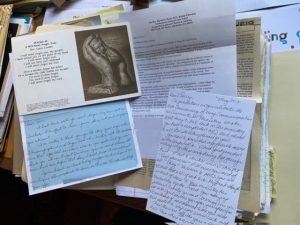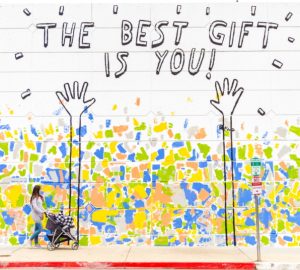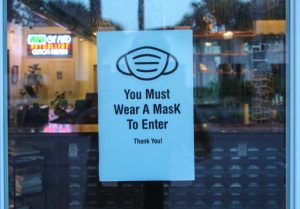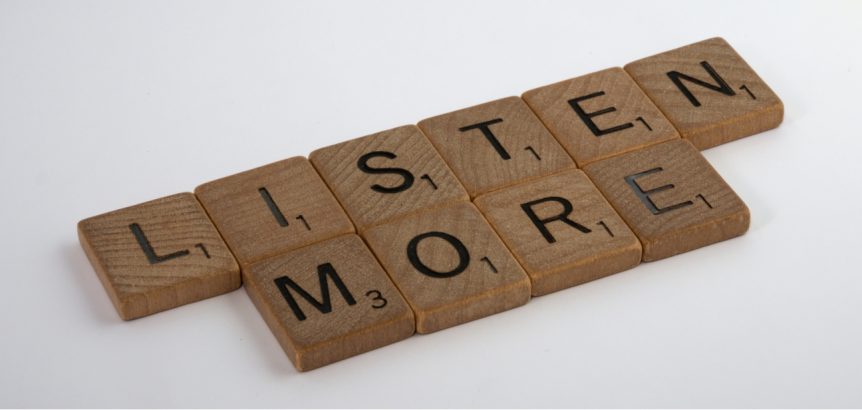As you may have noticed this month’s post is late! It wasn’t for a lack of topics but much the opposite. As an ADHD writer, trying to sift through and prioritize all of the possibilities can be challenging!
While I was considering possible topics, I was reading through some of the comments by folks who follow my blog and one by a friend who was a classmate over 50 years ago at Williamson College of the Trades jumped off my tablet! Here is what Ron wrote:
“Sometimes we do not recognize how we might inspire someone else. When I was still working, I had a co-worker who was struggling while going through a divorce. On a few occasions he asked to talk to me in the conference room. I primarily let him talk about his struggle and the decisions he had to make. I do not even remember whether I gave him any specific advice since I had never experienced what he was going through. However, just being willing to listen to him apparently was a means for him to work through the situation. To this day, he still comments on how important those conversations were at the time. Just being patient and a good listener can inspire others. It’s a good feeling.”
Ron lifts up some absolute essentials, such as being patient and a good listener. Knowing a little about Ron I expect he sent a very clear nonverbal message to his coworker each time he asked Ron if he had a minute to talk: “Yes you are worth my time, it’s the most valuable gift I can give you.” Second, I expect Ron left all his judgments, preconceptions, advice, and all his other tasks etc. in an invisible box just outside the conference room door.
Our willingness to offer undivided attention—even to someone who isn’t in our intimate circle—can be a gift beyond our understanding, as in the case of Ron’s coworker. Or perhaps it isn’t beyond our understanding. After all, isn’t that what all of us longs for?
Think for a moment about the last time you felt a person was fully present for you, who listened to you without judgment, without time limits, who didn’t check their texts or calls (or even turned their phone off entirely!), who was completely 100% focused on what you had to say? How did that feel?
Rita and I have had a primary care physician for several years now that we both often say is by far the best doctor we have ever had. He is brilliant, sensitive, doesn’t rush to prescribe medication, listens carefully to our input, and never makes me feel spoken down to. Most importantly, he is totally present for us. Although I have had many excellent doctors, none has demonstrated this level of focused care and concern. It’s as potent as any prescription he’s ever written us!

Terry’s Affirmation File
Occasionally I have been on the other end of the equation. One of the suggestions I have been giving to patients for many years is to start an “affirmation file.” It’s a box or file where you put thank-you cards, notes on conversations when someone affirmed you, recognitions you received, etc. When your negative self-messages are starting to pile up or you’re just feeling down, you can go to your affirmation file for a little attitude adjustment. I have had a few more visits to my affirmation file this past year!
There’s one handwritten note which was included with a check for a session that always seems to end up near the front of the file. Over time it has become one of the most cherished pieces in my 40 year collection. It reads as follows:
“As you know I have been in counseling with several other therapists before my best friend recommended you. They were all helpful at different times in my journey. However you were the first to make me feel like I was the most important person to you for that hour. You never seem to be watching the clock or just end of the session at the 50 minute point. You’re so focused on what I am saying. To be honest it felt a bit awkward at times. You ask questions if you aren’t completely sure of what I am saying and you take notes, I feel you really want to understand my pain and my journey. Even though I pay for the session I honestly see my time with you as a gift!”
I share this not to toot my own horn, but to highlight the awesome power of something we all have. It wasn’t my expert diagnosis or my brilliant advice that this patient treasured; it was my “mere” presence.

Photo by Dakota Corbin on Unsplash.com
If presence is so profoundly meaningful to folks and requires no special training or expertise, why does it seem to be so rare? Why am I personally so hesitant and reluctant at times to gift someone with my time and struggle to be totally present for them? Is it because I am afraid of opening a door that will be difficult to close? Might they want more and more of my time? It seems like most of my time is already committed; what will I need to cut back on or sacrifice?
If those are my reasons, they are really no reason at all, and I’ve been trying to consciously be more present in all of my interactions. Part of that is not watching the clock or checking my cell phone, but it also means not concentrating more on what my response will be than what the speaker is saying and trying very hard to understand not only the words being said, but the meaning and emotions behind those words. This has paid great dividends in my relationships.
Recently, I’ve expanded beyond my friends and family, and have started contemplating how I might apply the concept of presence to one of the issues that has been on my mind a lot lately: the increasing political division I see ripping apart our nation on every level.
In many respects, this division is understandable and I can see how many issues have become aligned with political camps. But I am totally confused—and to some degree frightened—as to how we have allowed an issue such as wearing face masks to slow the spread of a deadly and highly contagious disease to become politicized. When I see someone in a store not wearing a mask, I have to admit that I make snap judgments about them and my first impulse is to want to educate them to the “correct” way of thinking.

Photo by Mick Haupt on Unsplash.com
As you might guess, this approach doesn’t win a lot of converts! Nor does it bring me any greater understanding or empathy toward these non-mask wearers who I was increasingly seeing as “others” and “opponents” than fellow Americans or even fellow humans. I needed a different approach.
I wondered, what is really standing in the way of me setting aside, for a brief period, what I believe is the correct understanding or position long enough to be totally present in order to really begin to grasp how and why the other person has arrived at their position?
I’ve tried this new approach out on a number of occasions and I have to admit I haven’t had the success I hoped for. Seldom can I find an avenue to create a positive response to my request to hopefully better understand their decision to not wear a mask. Common responses have been, “none of your [bleeping] business” to “this mask propaganda is all bull—t!”
Occasionally I have gotten to have a conversation about the person’s reasons (often either fear of government overreach or disbelief that the pandemic is as dangerous as the media portrays it). And sometimes people seem genuinely unsure what their reasoning is. As far as I know, I have never changed anyone’s opinion (and I have never altered my own), but that isn’t the point. I want to have a “different” kind of conversation than they’re used to having—one where they’ll feel respected and valued despite our disagreement.
To be honest, though, I‘d probably keep doing it even without any evidence of success. Continuing to reach out to people on the other side of hot-button issues is one way for me to express my refusal to surrender to the widening divides in our country which I won’t believe are insurmountable. And being present keeps me focused on the human being in front of me, not the beliefs they hold. It helps me “un-demonize” them and move from anger and judgment to curiosity and empathy. My being present won’t necessarily change anyone else—or the world—but I know it changes me.
QUESTIONS FOR DEEPENING THE JOURNEY
- Who do you know that is a “rock star” at being present? What do they do that makes you feel they are completely tuned in to you?
- What was a time when someone was fully present for you? How did it make you feel?
- When was the last time you were “on the other side of the equation” and were able to be fully present for someone else? What factors enabled that experience to occur?
- What gets in the way of being fully present more often?
- Who do you most have trouble being present to? Why?
- Do you think it is possible to put all your effort into understanding and empathizing with someone and to simultaneously be angry at or scornful of them? What do you think the long-term effects of being fully present more often would be on you?
- If you don’t have one already, what would go into your affirmation file? Do you think starting one would be beneficial?
Banner photo by Brett Jordan on Unsplash.com



Terry,
Thanks for your perspective on the subject. It has helped me understand who I am and how I want to conduct my life.
This message speaks to me this week, thank you. It makes me wonder about prayer. Sometimes I wonder: “Is God really listening?” This article encourages another kind of wonder: “What if the Creator of all time and space, is making time and space to really listen to me, to give me all the attention of the Divine Will and Love and Presence?”
The Martin Luther quote, “I have so much to do that I shall spend the first three hours in prayer”, shows a focus I aspire to. Being present without a word to say does not come naturally to me. Thanks for bringing these two issues together in my thinking, Terry and Chris.
Hi Terry. Thanks for your thoughts about being present and listening. I have been thinking often recently about being present in a general way. Such as when I am going up and down stairs so as not to fall carelessly. Being present when I am trying to learn something on the piano. Even when I am doing a task I don’t particularly enjoy, like emptying the dishwasher or vacuuming cobwebs, it’s better if I am focused on what I am doing rather than trying to distract myself. But being present while listening to another is different. It requires more. I… Read more »